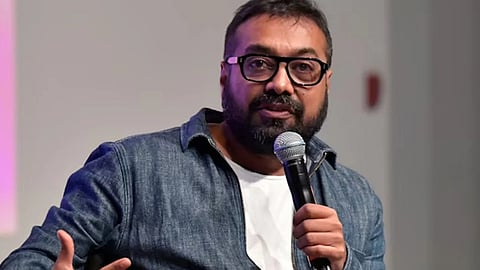Anurag Kashyap: The Industry Slowly Isolated Me
A filmmaker who refuses to fit in, Anurag Kashyap is on a roll again, co-producing several South Indian films along with Nishaanchi, which he directed, featuring an all-new cast. Now based in Bengaluru, Kashyap says he’s finally found peace away from the noise of Bollywood. In this conversation, he opens up about the industry that turned its back on him, rediscovering his rhythm down South, and why he took up acting despite never feeling confident about it.
You have made a comeback this year in a big way. How does this new phase look?
I have not gone anywhere and have been here all the while. In fact, I have been busier than ever before. People are surprised that I am doing much more now. Yes, I have learnt one thing now, and that is to work silently. I never realised this magic before.
What was the reason for shifting to Bengaluru?
It was no longer fun. The world was changing so fast, and at the rate it was changing, I couldn’t cope with it. I couldn’t understand anything. I don’t have filters while giving interviews. I answer every question thrown at me. My words were twisted and formatted according to their wish, and it was shown as an opinion. It was no longer a conversation. The industry also accepted that and slowly isolated me to the extent that they shunned me. They didn’t want to be seen with me, thinking that I was dangerous.
You have been in this industry for the last 32 years, so why this bitterness now?
I am not bitter but disappointed, because there is no conversation about cinema in the industry now. It’s all about box office numbers now. It started with Ghajini, and people have been trapped in the 100-crore-and-above business trap. Ram Gopal Varma once told me, a film becomes a blockbuster because of magic, and you realise that magic only when the film becomes a hit. Everyone has the formula for a hit film now. So many companies have shut down. I did not fight back because no one has the time to listen. Everyone has their own struggles.
So what have you been doing in the meantime?
Bad Girl was released in Tamil and Hindi. Every Friday, I have a release. My film Vagachipani had a world premiere at the Forum strand of the 2025 Berlin Film Festival. Two films were released at the Venice Festival. Productivity has increased. I am working harder than usual.
You cast Aaishvary Thackeray in a double role for his debut venture, Nishaanchi. How did he handle the pressure?
Incidentally, I had never offered him a double role. I had seen a monologue by him, and I chose him based on that. Since he’s from Maharashtra, I told him he will have to become a Kanpur boy. He enjoyed the script and asked me what I wanted him to play, Babloo or Dabloo. I mentioned the double role six months before the shoot. I saw his range, and after that, I felt he would be the best debut ever. He’s done a fabulous job.
Is the story inspired by real life?
No, this film is a throwback to my childhood films, Deewar, Trishul, and many more. I am from the North, so I have seen that life. After people watched Wasseypur, they felt that no one in India had abused so much earlier. They wanted to see Waaseypur 3. Then came Bombay Velvet, and everything was over. North India has not been represented properly in our films.
How much are you enjoying acting?
I don’t, it’s a lot of hard work. Filmmaking and writing are my passions. I am not good at acting, but if the budget is tight, you have to adjust, and to make a film, I take almost two years. In acting, I can earn the same amount in 20 days. I had gone into depression, and my health was bad. My daughter announced she is getting married. I did a remake, and then I started acting to earn money. She got married. But I started getting more offers. I worked hard on it.
Women in your films have always been portrayed strongly.
The girl next door types never appealed to me. I believe that women are tougher than men. I remember grandmother was a tough woman. My grandfather would never enter the house without her permission. My mother, when she was carrying me, was taking care of the village and the farm. My father was setting up power houses at that time. That is missing in films these days.

